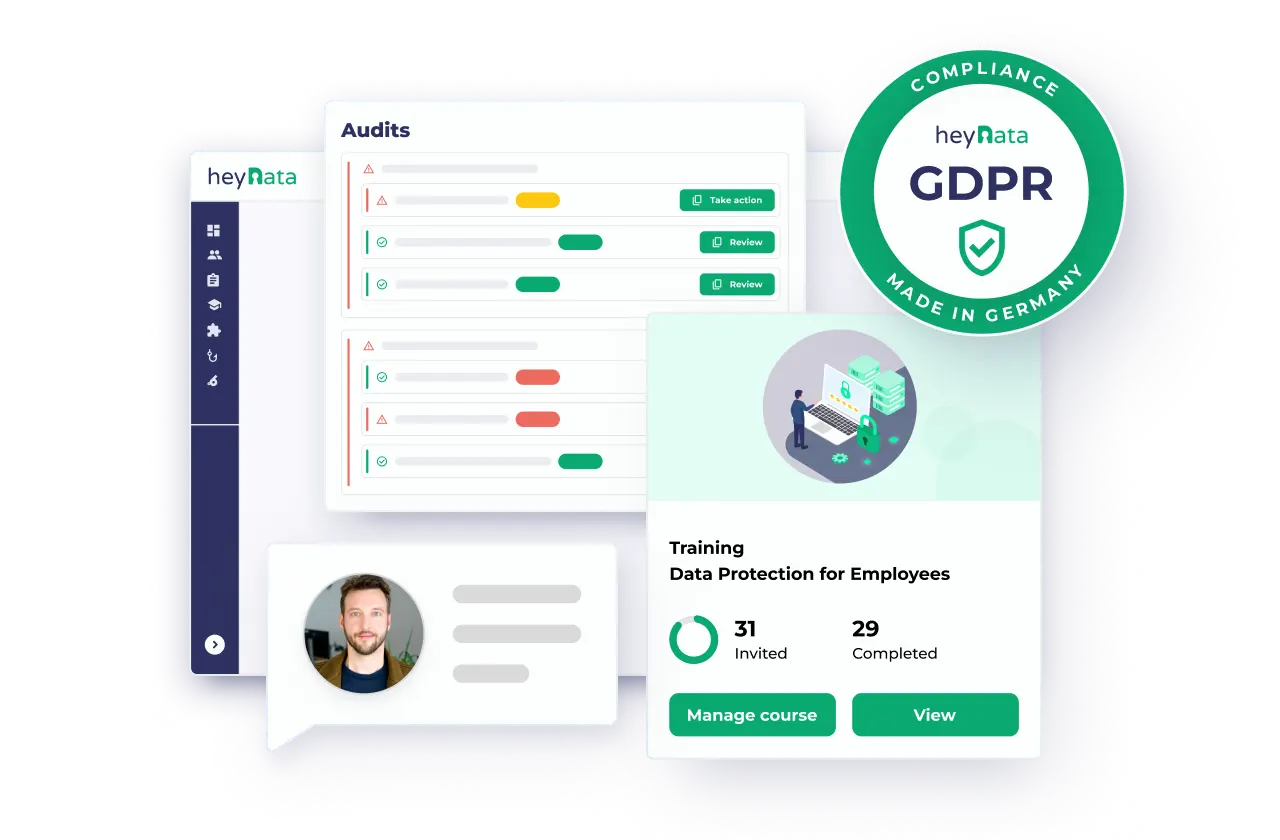Table of contents
Why Data Protection is Important for Businesses?
- Ensure Legal Compliance
Avoid heavy fines (up to 4% of annual revenue or €20 million) with complete compliance. - Customer Satisfaction & Trust
80% of consumers prefer service providers with transparent data processing. - Efficient Workflows
Standardized processes reduce sources of error by up to 40% and shorten internal workflows. - Brand and Employer Strength
Reliable data protection management enhances your reputation and attracts skilled employees.
How heyData Supports you
- Ready to Start in Weeks, not Months
Digital audits, policy creation, and training are implemented quickly - without additional IT overhead. - Transparent Costs
Monthly packages starting at 89€ per user, transparent and flexibly scalable. - Specialist Lawyer
External data protection officers with industry expertise are available to you at any time. - Central platform
Audit reports, guidelines, training materials, and your secure document vault - all clearly organized in one dashboard.
Hear it From Our Customers
Comparison: With vs. Without heyData
Aspect
Without heyData
With heyData
Effort & Speed
Manual checks with various tools - very time-consuming (up to 15 hours per quarter).
Fully automated audits and workflows: Results in a few hours, implementation in weeks.
Costs
Unforeseeable consulting costs, training, and working hours of the person involved
Clear price from €89/month, depending on the selected package - including audit, training, and support.
Expertise & Support
Dependence on sporadic external advice, and waiting times for answers to questions.
On-demand access to specialized lawyers and external DPOs with industry expertise, directly from the platform.
Documentation & Document Vault
Files scattered on local drives, no central overview.
Integrated, secure document storage: privacy policy, DPAs, ROPAs, TOM & Co. - all stored centrally, secure, and always up to date
Scalability
Every new location, app and process requires a completely new system and effort.
We scale with you, you need more support from us, we have the right package for you.
Your Compliance Journey with heyData
1
Digital Compliance Audit
Find out your current data protection status in just a few hours. Our tool automatically creates an overview, identifies risk areas, and provides you with a clearly structured action plan for data protection in your company.
2
Strategy Meeting With our Experts
You discuss your audit results with our lawyers in a personal meeting. Together, we set priorities and draw up a customized implementation roadmap - from technical measures to organizational processes.
3
Setup, Documentation, and Employee Training
We create all necessary guidelines and TOM documents for your company. You then guide your team step by step through the most important documents, sign the guidelines together, and complete interactive training courses.
4
Continuous Support & Optimization
Your compliance journey doesn't end with go-live: heyData offers ongoing support with regular audits, updated policies, and quick answers to all your data protection questions. This ensures that data protection in your company is always up to date.
FAQ
The General Data Protection Regulation (GDPR) is an EU legal framework that regulates the protection of personal data in companies and organizations. It entered into force on May 25, 2018 and contains rules for the processing, storage and transfer of personal data of EU residents.
The GDPR applies to all companies that process personal data of EU citizens, regardless of whether the company is based inside or outside the EU. It affects small and medium-sized enterprises as well as large corporations.
The GDPR grants individuals a number of rights, including the right to access their stored data, the right to rectify incorrect data, the right to have their data deleted ("right to be forgotten"), the right to data portability and the right to object to the processing of their data.
Companies must take various measures to comply with the GDPR. These include appointing a data protection officer (if required), conducting data protection impact assessments, implementing appropriate technical and organizational measures to protect personal data, obtaining data subjects' consent for data processing, and reporting data breaches.
Violations of the GDPR can result in fines of up to €20 million or 4% of the company's annual global turnover, whichever is greater. The actual amount of the fine depends on the nature, severity, and duration of the breach.
A data processor is a person or organization that processes personal data on behalf of a data controller. The processor acts according to the instructions of the controller and is subject to certain legal obligations under the GDPR.
The length of time for which personal data may be stored depends on the purpose of the data processing. Companies must store personal data for as long as is necessary to fulfill the purpose of the processing. In some cases, specific retention periods may be imposed by other laws or regulations.
A data breach refers to a security incident in which personal data is inadvertently or unlawfully accessed, disclosed, altered, or destroyed. When a data breach occurs and high risks to data subjects are expected, there is an obligation to assess and report it to the relevant supervisory authority and, in some cases, to the data subjects.
Internally, it is an important task of an internal or external data protection officer pursuant to Art. 39 (1) GDPR to point out compliance with data protection provisions. 17 Supervisory authorities monitor compliance with data protection regulations on the government side.
Customers of heyData get the very best of combining helpful data protection software and highly personalized expert support. With the heyData platform, you get your data protection under control. At the same time, our specialist lawyers are true experts in their field and also know the ins and outs of your business.





